一般将来时的用法
英语一般将来时的用法
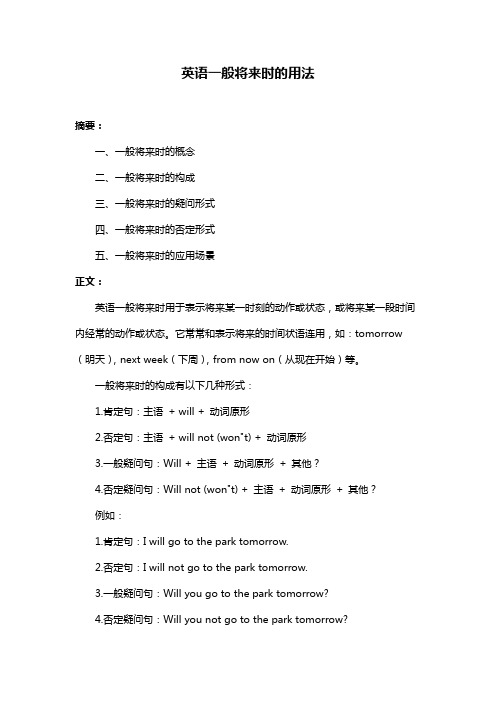
英语一般将来时的用法
摘要:
一、一般将来时的概念
二、一般将来时的构成
三、一般将来时的疑问形式
四、一般将来时的否定形式
五、一般将来时的应用场景
正文:
英语一般将来时用于表示将来某一时刻的动作或状态,或将来某一段时间内经常的动作或状态。
它常常和表示将来的时间状语连用,如:tomorrow (明天),next week(下周),from now on(从现在开始)等。
一般将来时的构成有以下几种形式:
1.肯定句:主语+ will + 动词原形
2.否定句:主语+ will not (won"t) + 动词原形
3.一般疑问句:Will + 主语+ 动词原形+ 其他?
4.否定疑问句:Will not (won"t) + 主语+ 动词原形+ 其他?
例如:
1.肯定句:I will go to the park tomorrow.
2.否定句:I will not go to the park tomorrow.
3.一般疑问句:Will you go to the park tomorrow?
4.否定疑问句:Will you not go to the park tomorrow?
一般将来时在实际应用中非常广泛,可以用于描述未来的计划、预期、愿望等。
一般将来时用法总结
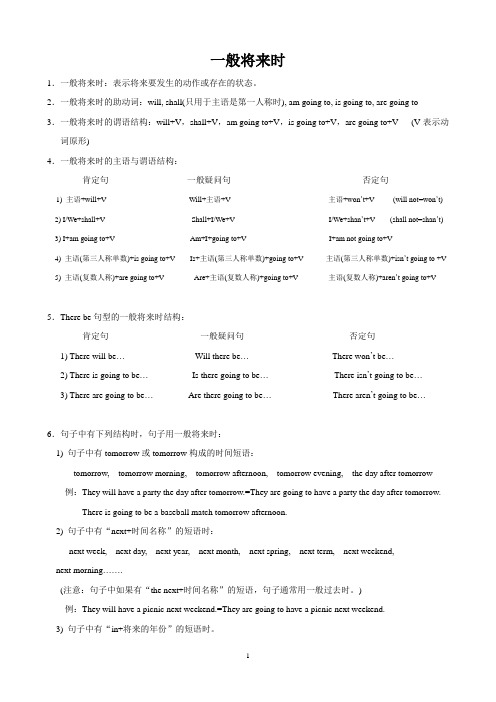
一般将来时1.一般将来时:表示将来要发生的动作或存在的状态。
2.一般将来时的助动词:will, shall(只用于主语是第一人称时), am going to, is going to, are going to3.一般将来时的谓语结构:will+V,shall+V,am going to+V,is going to+V,are going to+V (V表示动词原形)4.一般将来时的主语与谓语结构:肯定句一般疑问句否定句1) 主语+will+V Will+主语+V 主语+won’t+V (will not=won’t)2) I/We+shall+V Shall+I/We+V I/We+shan’t+V (shall not=shan’t)3) I+am going to+V Am+I+going to+V I+am not going to+V4) 主语(第三人称单数)+is going to+V Is+主语(第三人称单数)+going to+V 主语(第三人称单数)+isn’t going to +V5) 主语(复数人称)+are going to+V Are+主语(复数人称)+going to+V 主语(复数人称)+aren’t going to+V5.There be句型的一般将来时结构:肯定句一般疑问句否定句1) There will be…Will there be…There won’t be…2) There is going to be…Is there going to be…There isn’t going to be…3) There are going to be…Are there going to be…There aren’t going to be…6.句子中有下列结构时,句子用一般将来时:1) 句子中有tomorrow或tomorrow构成的时间短语:tomorrow, tomorrow morning, tomorrow afternoon, tomorrow evening, the day after tomorrow 例:They will have a party the day after tomorrow.=They are going to have a party the day after tomorrow.There is going to be a baseball match tomorrow afternoon.2) 句子中有“next+时间名称”的短语时:next week, next day, next year, next month, next spring, next term, next weekend,next morning…….(注意:句子中如果有“the next+时间名称”的短语,句子通常用一般过去时。
一般将来时
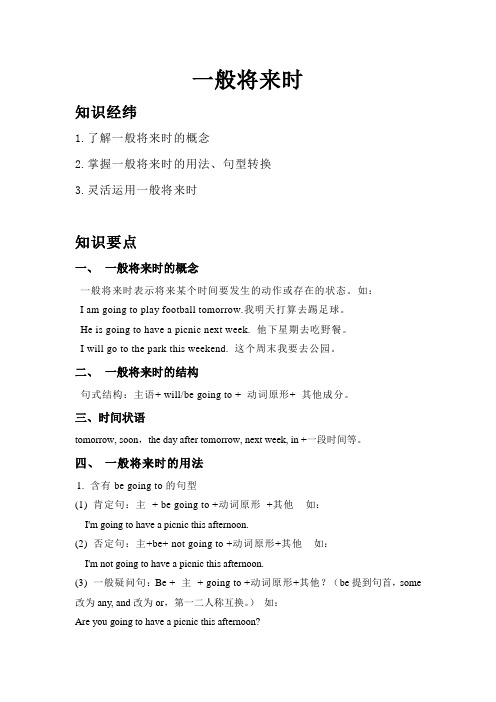
一般将来时知识经纬1.了解一般将来时的概念2.掌握一般将来时的用法、句型转换3.灵活运用一般将来时知识要点一、一般将来时的概念一般将来时表示将来某个时间要发生的动作或存在的状态。
如:I am going to play football tomorrow.我明天打算去踢足球。
He is going to have a picnic next week. 他下星期去吃野餐。
I will go to the park this weekend. 这个周末我要去公园。
二、一般将来时的结构句式结构:主语+ will/be going to + 动词原形+ 其他成分。
三、时间状语tomorrow, soon,the day after tomorrow, next week, in +一段时间等。
四、一般将来时的用法1. 含有be going to的句型(1) 肯定句:主+ be going to +动词原形+其他如:I'm going to have a picnic this afternoon.(2) 否定句:主+be+ not going to +动词原形+其他如:I'm not going to have a picnic this afternoon.(3) 一般疑问句:Be + 主+ going to +动词原形+其他?(be提到句首,some 改为any, and改为or,第一二人称互换。
)如:Are you going to have a picnic this afternoon?肯定回答:Yes, I am.否定回答:No, I’m not.2. 含有will的句型(will可用于所有人称,shall只用于第一人称I和we)( 1 ) 肯定句:主+ will +动词原形+其他如:I will play football tomorrow.(2) 否定句:主+ won’t +动词原形+其他(will后加not成won't)如:I won’t play football tomorrow.(3) 一般疑问句:Will + 主+ +动词原形+其他?(will提到句首,some改为any, and改为or,第一二人称互换) 如:Will you play football tomorrow?肯定回答:Yes, I will.否定回答:No, I won’t.五、一般将来时的特殊疑问句一般情况下,一般将来时的对划线部分有三种情况。
一般将来时用法及例句
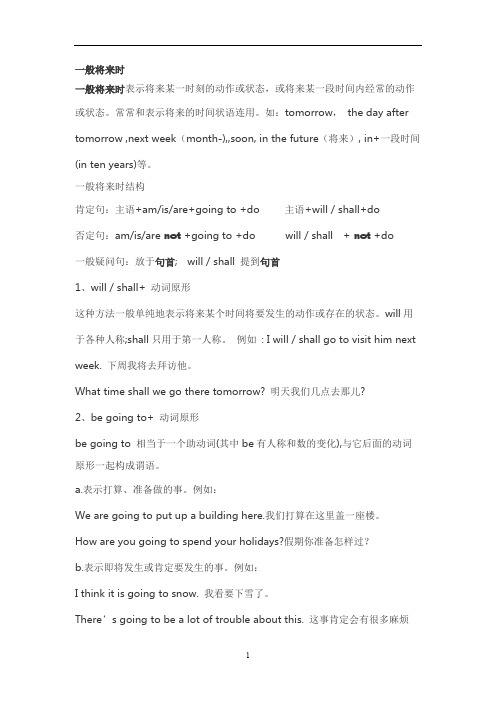
一般将来时一般将来时表示将来某一时刻的动作或状态,或将来某一段时间内经常的动作或状态。
常常和表示将来的时间状语连用。
如:tomorrow,the day after tomorrow ,next week(month-),,soon, in the future(将来), in+一段时间(in ten years)等。
一般将来时结构肯定句:主语+am/is/are+going to +do 主语+will / shall+do否定句:am/is/are not +going to +do will / shall + not +do一般疑问句:放于句首; will / shall 提到句首1、will / shall+ 动词原形这种方法一般单纯地表示将来某个时间将要发生的动作或存在的状态。
will用于各种人称;shall只用于第一人称。
例如: I will / shall go to visit him next week. 下周我将去拜访他。
What time shall we go there tomorrow? 明天我们几点去那儿?2、be going to+ 动词原形be going to 相当于一个助动词(其中be有人称和数的变化),与它后面的动词原形一起构成谓语。
a.表示打算、准备做的事。
例如:We are going to put up a building here.我们打算在这里盖一座楼。
How are you going to spend your holidays?假期你准备怎样过?b.表示即将发生或肯定要发生的事。
例如:I think it is going to snow. 我看要下雪了。
There’s going to be a lot of trouble about this. 这事肯定会有很多麻烦一、选择填空:( ) 1. There __________ a meeting tomorrow afternoon.A. will be going toB. will going to beC. is going to beD. will go to be( ) 2. Charlie ________ here next month.A. isn’t workingB. doesn’t workingC. isn’t going to workingD. won’t work( ) 3. He ________ very busy this week, he ________ free next week.A. will be; isB. is; isC. will be; will beD. is; will be( ) 4. There ________ a dolphin show in the zoo tomorrow evening.A. wasB. is going to haveC. will haveD. is going to be( ) 5. –________ you ________ free tomorrow?– No. I ________ free the day after tomorrow.A. Are; going to; willB. Are; going to be; willC. Are; going to; will beD. Are; going to be; will be ( ) 6. Mother ________ me a nice present on my next birthday.A. will givesB. will giveC. givesD. give( ) 7. – Shall I buy a cup of tea for you?–________. (不,不要。
一般将来时态用法

一般将来时态用法一般将来时表示在将来某个时间要发生的动作或存在的状态。
一. 一般将来时的基本用法:表示“纯粹的将来”:①表示将要发生的动作或情况,常带有表示将来的时间状语,如tomorrow, next week, in two days, from now on 等。
如:It will be fine tomorrow. 明天天气晴朗。
②表示预料将要发生的动作或情况。
如:You will feel better after having this medicine. 吃了这药,你就会感觉好些的。
二. 一般将来时的构成:1. 由助动词“ shall/ will +动词原形”构成,shall 用于第一人称,will 用于第二、第三人称,而美式英语在陈述句中无论什么人称,一律用will. 表示“带有情态意义的将来”,用来表示意图,用will 来表示。
如:I will be more careful next time. 下次我要更加小心。
I won't go shopping this afternoon, but she will. 今天下午我不想去购物,但她想去。
2. will 在疑问句中,用来表示有礼貌地征询对方的意见。
如:Will you have some more tea 要不要再喝点茶What shall we do this weekend 本周末我们要干什么3. 一般将来时的否定和疑问形式:一般将来时的否定形式是will not ,缩写为won't; shall not ,缩写为shan't 。
一般将来时的疑问形式是把will/ shall 提到主语前。
如:He won’t go to th e park this Sunday. 本周日他不去公园。
Will you go swimming with me 和我一起去游泳好吗4. shall只用于第一人称,如用于第二、第三人称,就失去助动词的意义,已变为情态动词,试比较: He shall come. 他必须来。
完整版)一般将来时基本用法
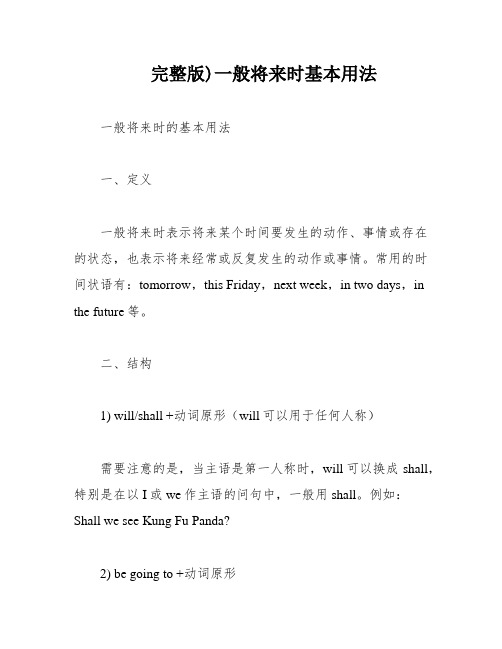
完整版)一般将来时基本用法一般将来时的基本用法一、定义一般将来时表示将来某个时间要发生的动作、事情或存在的状态,也表示将来经常或反复发生的动作或事情。
常用的时间状语有:tomorrow,this Friday,next week,in two days,in the future等。
二、结构1) will/shall +动词原形(will可以用于任何人称)需要注意的是,当主语是第一人称时,will可以换成shall,特别是在以I或we作主语的问句中,一般用shall。
例如:Shall we see Kung Fu Panda?2) be going to +动词原形例如:I’m going to play the piano。
be going to和will的区别be going to和will的用法虽然都表示将来发生动作或情况,一般情况下能互换。
但它们的用法是有区别的。
be going to主要用于:1、表示事先经过考虑、安排好打算、计划要做的事情。
例如:Dad and I are going to watch an opera this afternoon.2、表示根据目前某种迹象判断,某事非常有可能发生。
例如:Look。
There come the dark clouds。
It is going to rain.三、一般疑问句和否定句一般疑问句:1) will/shall +动词原形(will可以用于任何人称)——在will后加not2) be going to +动词原形——在be后加not例如:She will come back in three days.Will she not come back in three days?They are going to clean their classroom.Are they not going to clean their classroom?否定句:1) will/shall +动词原形(will可以用于任何人称)——将will提前2) be going to +动词原形——将be提前例如:She will come back in three days.She will not come back in three days.Will she come back in three days?XXX is whether they will actually do it。
一般将来时的使用方法是什么
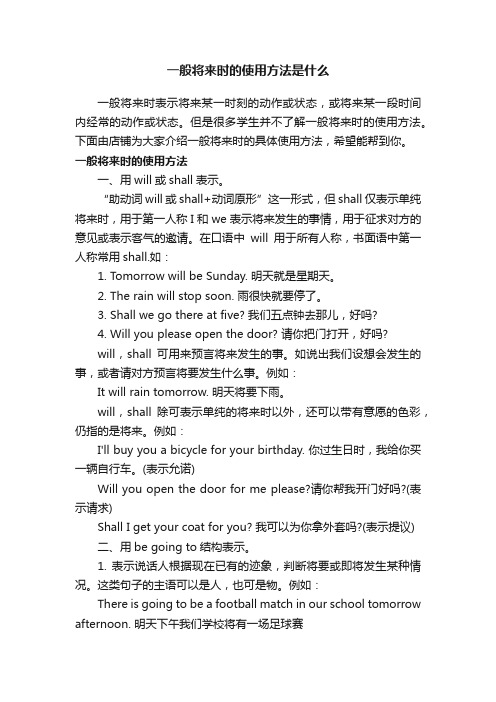
一般将来时的使用方法是什么一般将来时表示将来某一时刻的动作或状态,或将来某一段时间内经常的动作或状态。
但是很多学生并不了解一般将来时的使用方法。
下面由店铺为大家介绍一般将来时的具体使用方法,希望能帮到你。
一般将来时的使用方法一、用will或shall表示。
“助动词will或shall+动词原形”这一形式,但shall 仅表示单纯将来时,用于第一人称I和we表示将来发生的事情,用于征求对方的意见或表示客气的邀请。
在口语中will用于所有人称,书面语中第一人称常用shall.如:1. Tomorrow will be Sunday. 明天就是星期天。
2. The rain will stop soon. 雨很快就要停了。
3. Shall we go there at five? 我们五点钟去那儿,好吗?4. Will you please open the door? 请你把门打开,好吗?will,shall可用来预言将来发生的事。
如说出我们设想会发生的事,或者请对方预言将要发生什么事。
例如:It will rain tomorrow. 明天将要下雨。
will,shall除可表示单纯的将来时以外,还可以带有意愿的色彩,仍指的是将来。
例如:I'll buy you a bicycle for your birthday. 你过生日时,我给你买一辆自行车。
(表示允诺)Will you open the door for me please?请你帮我开门好吗?(表示请求)Shall I get your coat for you? 我可以为你拿外套吗?(表示提议)二、用be going to结构表示。
1. 表示说话人根据现在已有的迹象,判断将要或即将发生某种情况。
这类句子的主语可以是人,也可是物。
例如:There is going to be a football match in our school tomorrow afternoon. 明天下午我们学校将有一场足球赛(已有告示)I feel terrible.I think I'm going to die. 我感到难受极了,我想我快不行了。
一般将来时的用法

一般将来时的用法一般将来时(Simple Future Tense)是描述将来发生的事情或计划的一种时态。
在英语中,一般将来时的构成方式比较简单,一般使用助动词“will”或“be going to”来表示将来时态。
除了这两种方式外,还有其他一些用法和注意事项。
本文将详细介绍一般将来时的用法。
一、will的用法1. 表示意愿或决定:我们可以使用will表示即时决定或表示意愿。
例如:- I am thirsty. I will get some water.(我口渴了。
我要去倒些水。
)- He doesn't have a car, so I will lend him mine.(他没有车,所以我会借给他我的车。
)2. 表示预测或推测:will可用来表达对未来情况的推测或预测。
例如:- It's getting cloudy. I think it will rain soon.(天开始多云了。
我觉得很快就会下雨。
)- She is such a talented musician. I'm sure she will become famous one day.(她是一个非常有才华的音乐家。
我相信她总有一天会出名的。
)3. 提供承诺或请求:will也可以用来表示承诺或请求。
例如:- I will definitely help you with your project.(我一定会帮你完成你的项目。
)- Will you please pass me the salt?(请你把盐递给我好吗?)二、be going to的用法1. 表示计划或打算:be going to可以用来表示我们已经有了计划或打算要做某事。
例如:- I am going to visit my parents this weekend.(我打算这个周末去看望我的父母。
)- They are going to open a new restaurant in town.(他们打算在城里开一家新餐厅。
一般将来时态的结构和用法
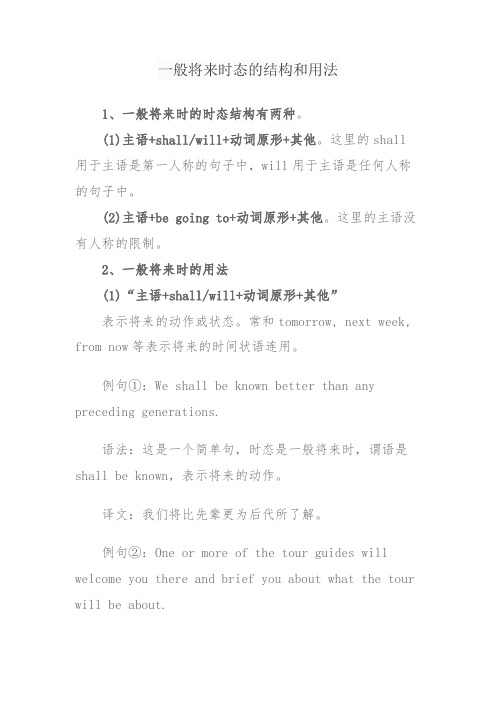
一般将来时态的结构和用法1、一般将来时的时态结构有两种。
(1)主语+shall/will+动词原形+其他。
这里的shall 用于主语是第一人称的句子中,will用于主语是任何人称的句子中。
(2)主语+be going to+动词原形+其他。
这里的主语没有人称的限制。
2、一般将来时的用法(1)“主语+shall/will+动词原形+其他”表示将来的动作或状态。
常和tomorrow, next week, from now等表示将来的时间状语连用。
例句①:We shall be known better than any preceding generations.语法:这是一个简单句,时态是一般将来时,谓语是shall be known,表示将来的动作。
译文:我们将比先辈更为后代所了解。
例句②:One or more of the tour guides will welcome you there and brief you about what the tour will be about.语法:这是一个主从复合句。
what引导的是宾语从句;主句和从句的时态都是一般将来时,谓语分别是will welcome…and brief和will be,表示将来的动作。
译文:有一个或几个导游会到那里迎接你们,并且向你们简要介绍参观的内容。
(2)“be going to+动词原形+其他”表示事先考虑过的将要发生的动作以及已有迹象表明必将要发生的某事,意为“打算,就要”。
例句:Now we go to Jane who is going to tell us about what's happening in town this weekend.语法:这是一个多重主从复合句。
who引导的是定语从句,该从句的时态是一般将来时,谓语是is going to tell;该定语从句中又包含一个由what引导的宾语从句,作介词about的宾语。
一般将来时的用法
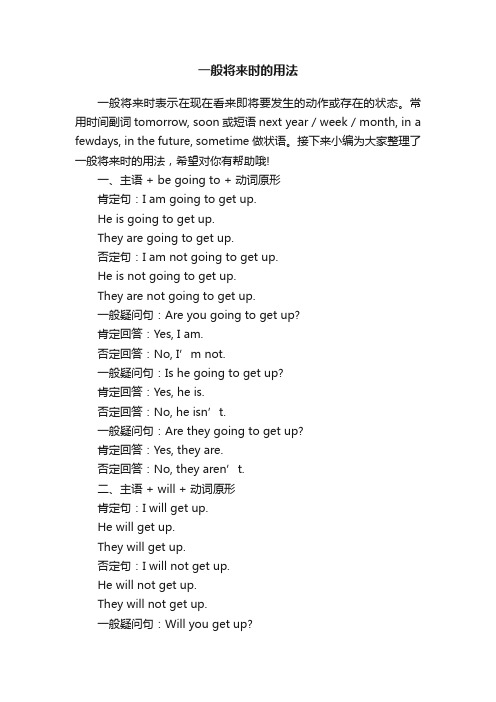
一般将来时的用法一般将来时表示在现在看来即将要发生的动作或存在的状态。
常用时间副词tomorrow, soon或短语next year / week / month, in a fewdays, in the future, sometime 做状语。
接下来小编为大家整理了一般将来时的用法,希望对你有帮助哦!一、主语 + be going to + 动词原形肯定句:I am going to get up.He is going to get up.They are going to get up.否定句:I am not going to get up.He is not going to get up.They are not going to get up.一般疑问句:Are you going to get up?肯定回答:Yes, I am.否定回答:No, I’m not.一般疑问句:Is he going to get up?肯定回答:Yes, he is.否定回答:No, he isn’t.一般疑问句:Are they going to get up?肯定回答:Yes, they are.否定回答:No, they aren’t.二、主语 + will + 动词原形肯定句:I will get up.He will get up.They will get up.否定句:I will not get up.He will not get up.They will not get up.一般疑问句:Will you get up?肯定回答:Yes, I will.否定回答:No, I won’t.一般疑问句:Will he get up.肯定回答:Yes, he will.否定回答:No, he won’t.一般疑问句:Are they going to get up?肯定回答:Yes, they are.否定回答:No, they aren’t.一般将来时/式(The Simple Future tense)时态定义be going to表主观的打算shall和will常常缩写成'll ,紧接在主语之后。
一般将来时的用法
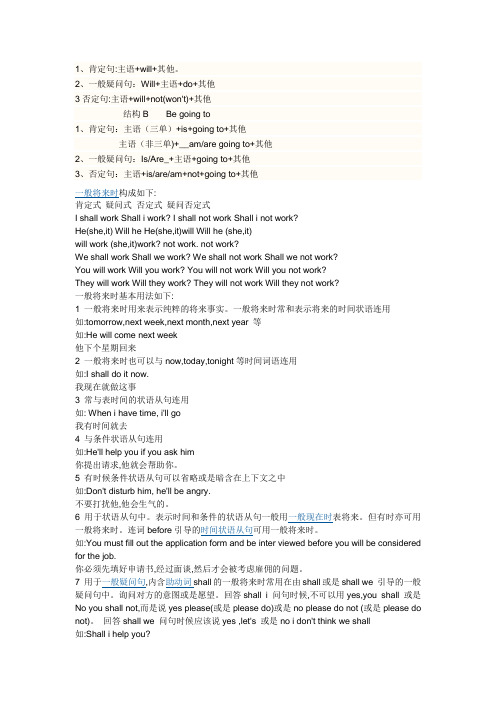
1、肯定句:主语+will+其他。
2、一般疑问句:Will+主语+do+其他3否定句:主语+will+not(won't)+其他结构B Be going to1、肯定句:主语(三单)+is+going to+其他主语(非三单)+__am/are going to+其他2、一般疑问句:Is/Are_+主语+going to+其他3、否定句:主语+is/are/am+not+going to+其他一般将来时构成如下:肯定式疑问式否定式疑问否定式I shall work Shall i work? I shall not work Shall i not work?He(she,it) Will he He(she,it)will Will he (she,it)will work (she,it)work? not work. not work?We shall work Shall we work? We shall not work Shall we not work?You will work Will you work? You will not work Will you not work?They will work Will they work? They will not work Will they not work?一般将来时基本用法如下:1 一般将来时用来表示纯粹的将来事实。
一般将来时常和表示将来的时间状语连用如:tomorrow,next week,next month,next year 等如:He will come next week他下个星期回来2 一般将来时也可以与now,today,tonight等时间词语连用如:I shall do it now.我现在就做这事3 常与表时间的状语从句连用如: When i have time, i'll go我有时间就去4 与条件状语从句连用如:He'll help you if you ask him你提出请求,他就会帮助你。
一般将来时的用法

一般将来时的用法一般将来时表示将来某一时刻的动作或状态,或将来某一段时间内经常的动作或状态。
一般将来时的用法有哪些呢?本文是店铺整理一般将来时的用法的资料,仅供参考。
一般将来时的用法一般将来时表示将来某一时刻的动作或状态,或将来某一段时间内经常的动作或状态.常常和表示将来的时间状语连用.如:tomorrow(明天),next week(下周),from now on(从现在开始);in the future(将来)等.一般将来时由助动词shall(第一人称),will(第二、三人称) 动词原形构成.美国英语则不管什么人称,一律用will.用法:(1)一般将来时表示将要发生的动作或情况.例如:I will(shall) arrive tomorrow.我明天到.Will you be free tonight?你今晚有空吗?We won’t (shan’t) be busy this evening.我们今晚不忙.(2)在一般将来时的句子中,有时有表示将来时间的状语,有时没有时间状语,这时要从意思上判断是否指未来的动作或情况.例如:Will she come?她(会)来吗?We’ll only stay for two weeks.我们只待两星期.The meeting won’t last long.会开不了多久.(3)在以第一人称I或we作主语的问句中,一般使用助动词shall,这时或是征求对方的意见(a),或是询问一个情况(b):a.Where shall we meet?我们在哪儿碰头?b.Shall we have any classes tomorrow?明天我们有课吗?在这类问句中,近年来也有不少人用will,特别是在美国.例如:How will I get there?我怎么去?(4)be going to 动词原形 a.表示计划、打算、准备做的事.例如:We are going to put up a building here.我们打算在这里盖一座楼.How are you going to spend your holidays?假期你准备怎样过?b.表示即将发生或肯定要发生的事.例如:I think it is going to snow.我看要下雪了.There’s going to be a lot of trouble about this.这事肯定会有很多麻烦.一般将来时的其他用法一般将来时表示将来某一时刻的动作或状态,其表达形式除了“shall(第一人称),will(第二、三人称)+动词原形构成”外,还有以下几种形式.一.“be going to+动词原形”表示即将发生的或最近打算进行的事.例如:①It is going to rain.要下雨了.②We are going to ha ve a meeting today.今天我们开会.二.go,come,start,move,sail,leave,arrive,stay,live,fly,等可用进行时态表示按计划即将发生的动作,例如:I'm leaving for Beijing.我要去北京.三.“be to+动词原形”表示按计划要发生的事或征求对方意见.例如:①Are we to go on with this work?我们继续干吗?②The boy is to go to school tomorrow.这个男孩明天要去上学.四.“be about to+动词原形”表示即将发生的动作,意为:很快,马上.后面一般不跟时间状语.例如:We are about to leave.我们马上就走.五.某些词,如come,go,leave,arrive,start,get,stay ,live,fly等的一般现在时也可表示将来.①The meeting starts at five o'clock.会议五点开始.②He gets off at the next stop.他下一站下车.六.“be due to"构成的谓语,意味“定于…”也可表示将来时.百度百科上有详细介绍,很全面的哦.一般将来时基本用法一般将来时构成如下:肯定式疑问式否定式疑问否定式I shall work Shall i work? I shall not work Shall i not work? He(she,it) Will he (she,it) He(she,it)will not Will he (she,it) not We shall work Shall we work? We shall not work Shall we not work? You will work Will you work? You will not work Will you not work? They will work Will they work? They will not work Will they not work?其结构有如下几种: 1)will + 动词原形(will可以用于任何人称) 需要注意的是当主语是第一人称时will可以换成shall,特别是在以I或we 作主语的问句中,一般用shall. 例. Shall we go to the zoo? 2)be going to +动词原形第一种结构的句式变化是: 变否定句在will后边加not. 变一般疑问句把will提前. e.g. She will come back in three days. She will not come back in three days. Will She come back in three days? 第二种结构的句式变化要在be上做文章. E.g. They are going to clean their classroom. They are not going to clean their classroom. Are they going to clean their classroom?一般将来时基本用法如下:1 一般将来时用来表示纯粹的将来事实。
一般将来时的用法

一般将来时的用法一般将来时是中学英语常用的一种时态,同学们在一开始学习使用的是be going to +动词原形这一结构来进行口语操练,也许是先入为主的原因,在完成句子或书面表达的时候,只要碰到将来时的句子,他们就不假思索,一概套用be going to +动词原形这一结构,自然起不到要表达的意思,结果是生搬硬套。
实际上,表示将来时有多中方式,所以有必要把将来时的表达方式提一提,希望能引起同学们的注意。
1.be going to +动词原形这一形式表示主体现在打算或将来要做某事。
这种打算往往是事先考虑好的。
例如:My brother is going to learn English next year. 我哥哥准备明年学英语。
I’m going to see the football match this afternoon. 今天下午我打算去看足球赛。
I’m going to meet Tom at the station at six. 我6点钟要到火车站接汤姆。
可见be going to形式常常可起到将来时的作用,但侧重于口语,表示事先的计划,已经决定或安排要做的事客观或肯定要发生的事。
也用来表示必然,很可能发生的事或自然现象。
如:Lok! It’s going to rain soon. 看!天要快要下雨啦。
It’s going to be a rainy day tomorrow. 明天将会是个雨天。
2.will/shall+动词原形。
“will/shall+动词原形”结构,will用于各人称,shall只有于第一人称。
表示一个次要发生的动作或状态,有时表示预见、意图或临时决定的事。
如:Do you think it’ll rain. 你认为天会下雨吗?He’ll be here in half an hour. 。
他半小时后会到这。
I’ll do it if you like . 如果你喜欢的话我会干的。
一般将来时的用法
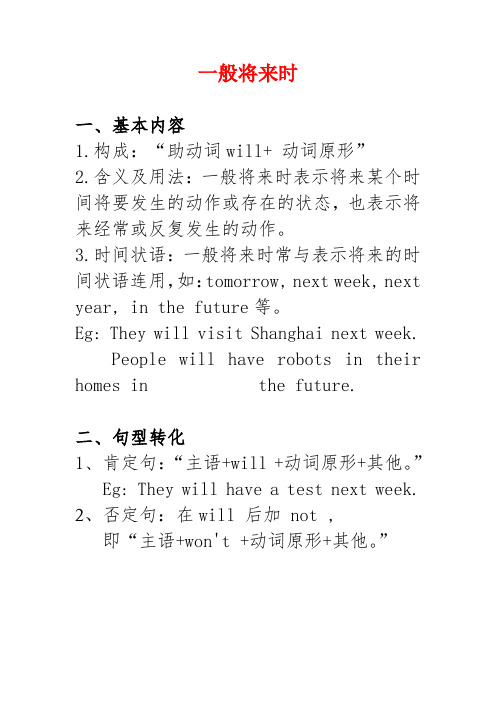
一般将来时一、基本内容1.构成:“助动词will+ 动词原形”2.含义及用法:一般将来时表示将来某个时间将要发生的动作或存在的状态,也表示将来经常或反复发生的动作。
3.时间状语:一般将来时常与表示将来的时间状语连用,如:tomorrow, next week, next year, in the future等。
Eg: They will visit Shanghai next week.People will have robots in their homes in the future.二、句型转化1、肯定句:“主语+will +动词原形+其他。
” Eg: They will have a test next week.2、否定句:在will 后加 not ,即“主语+won't +动词原形+其他。
”Eg: She will be an engineer.(改为否定句)She won't be an engineer.3、一般疑问句:将will提到主语前面,即“Will+ 主语+动词原形+其他?”回答时使用yes/no.Eg: He will live in New York in 10 years. (改为一般疑问句并作肯定回答)Will he live in New York in 10 years? Yes, he will.三、注意事项1、Will 常表示客观的将来,也可表示“带意愿色彩的将来”,也可表示“委婉客气的邀请或命令”Eg: He will be 18 years olds next month.下个月他将满18岁。
I will tell you all about it. 我愿意把所有与此相关的事都告诉你。
Will you please close the door? 请你把门关上好吗?2、在疑问句中,主语为第一人称(I 和we)时,常用助动词shall。
一般将来时用法

一般将来时用法一、一般将来时的动词形式一般将来时表示将来某个时间将要发生的动作或存在的状态,也表示将来经常或反复发生的动作。
will, be going to …, be to…, be about to都可以用来表示一般将来时。
一般将来时由助动词shall或will加动词原形构成,shall用于第一人称(____________,_______________),will用于第二、三人称。
但是现在第一人称一般也用will,其区别并不明显。
(或“be going to + 动词原形)常与tomorrow, next… , in (the) future,soon, in five days,in two weeks等连用。
如: I shall not come if it rains tomorrow. 如明天下雨我就不来。
My father will leave for China next week. 我的爸爸下星期要到中国去。
“I’ll, You’ll, He’ll , She’ll , It’ll, We’ll , They’ll …”是简缩形式。
二.一般将来时的句型1.肯定句:主语+shall /will+动词+其他成份The workers will build a new school here next year.工人们明年将在这儿盖一所新学校。
They will go shopping this afternoon. 今天下午他们将要去购物。
We shall have a delicious dinner tonight. 今晚我们将美餐一顿。
We shall be there before dark. 我们天黑前会到达那里。
2.否定句:主语+shall /will+not+动词+其他成份She won’t come back this week.这一周她不回来了。
I will not go shopping one hour later. 一小时之后我不会去购物。
一般将来时用法
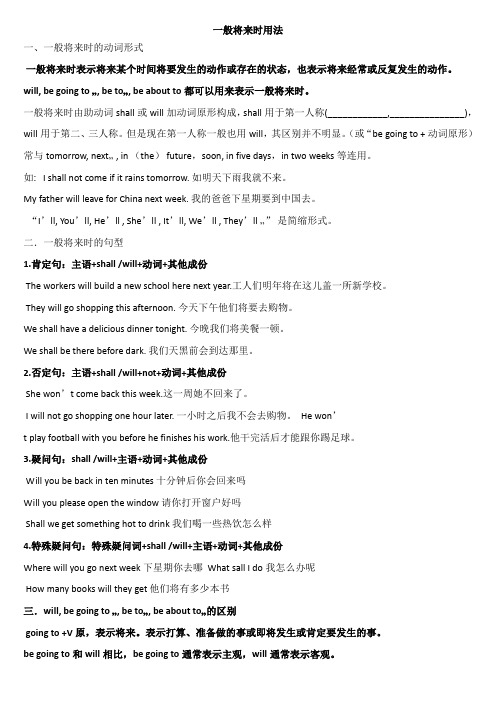
一般将来时用法一、一般将来时的动词形式一般将来时表示将来某个时间将要发生的动作或存在的状态,也表示将来经常或反复发生的动作。
will, be going to …, be to…, be about to都可以用来表示一般将来时。
一般将来时由助动词shall或will加动词原形构成,shall用于第一人称(____________,_______________),will用于第二、三人称。
但是现在第一人称一般也用will,其区别并不明显。
(或“be going to + 动词原形)常与tomorrow, next… , in (the) future,soon, in five days,in two weeks等连用。
如: I shall not come if it rains tomorrow. 如明天下雨我就不来。
My father will leave for China next week. 我的爸爸下星期要到中国去。
“I’ll, You’ll, He’ll , She’ll , It’ll, We’ll , They’ll …”是简缩形式。
二.一般将来时的句型1.肯定句:主语+shall /will+动词+其他成份The workers will build a new school here next year.工人们明年将在这儿盖一所新学校。
They will go shopping this afternoon. 今天下午他们将要去购物。
We shall have a delicious dinner tonight. 今晚我们将美餐一顿。
We shall be there before dark. 我们天黑前会到达那里。
2.否定句:主语+shall /will+not+动词+其他成份She won’t come back this week.这一周她不回来了。
I will not go shopping one hour later. 一小时之后我不会去购物。
- 1、下载文档前请自行甄别文档内容的完整性,平台不提供额外的编辑、内容补充、找答案等附加服务。
- 2、"仅部分预览"的文档,不可在线预览部分如存在完整性等问题,可反馈申请退款(可完整预览的文档不适用该条件!)。
- 3、如文档侵犯您的权益,请联系客服反馈,我们会尽快为您处理(人工客服工作时间:9:00-18:30)。
一般将来时的用法
一、按括号内的提示,改写句子:
1、People in the north often go skating in winter. (next winter)
2、There are two cinemas in that town. (next year)
3、He comes back late. (in two days)
4、She is a conductor of a train. (soon)
5、Li Ming is ten years old. (next year)
6、I sometimes write to my mother in the evening. (tonight)
7、He went there by plane. (some day next year)
8、China is a modern and strong country. (in twenty years)
9、Do you study hard? (from now on)
10、She didn’t speak English at the meeting. (before l ong)
二、用一般现在时或一般将来时填充:
1、I ______ (leave) in a minute. I ______ (finish) all my wdork before I _______ (leave).
2、——How long _______ you _______ (study) in our country?
——I ______ (plan) to be here for about one more year.
——I ______ (hope) to visit the other parts of your country.
——What ______ you ______ (do) after you _______ (leave) here?
——I ______ (return) home and _______ (get) a job.
3、I ______ (be) tired. I ______ (go) to bed early tonight.
4、Mary’s birthday is next Monday, her mother _______ (give) her a present.
5、It is very cold these days. It ______ (snow) soon.
6、——_______ you _______ (be) here this Saturday?
——No. I _______ (visit) my teacher.
7、——_______ I _______ (get) you a copy of taday’s newspaper? ——Thank you.
8、I am afr aid there _______ (be) a meeting this afternoon. I can’t join you.
9、Mike _______ (believe, not) this until he _______ (see) it with his own eyes.
10、Most of us don’t think their team _______ (win).
三、选择填空
( ) 1. There __________ a meeting tomorrow afternoon.
A. will be going to
B. will going to be
C. is going to be
D. will go to be
( ) 2. Charlie ________ here next month.
A. isn’t working
B. doesn’t working
C. isn’t going to working
D. won’t work
( ) 3. He ________ very busy this week, he ________ free next week.
A. will be; is
B. is; is
C. will be; will be
D. is; will be
( ) 4. There ________ a dolphin show in the zoo tomorrow evening.
A. was
B. is going to have
C. will have
D. is going to be
( ) 5. –________ you ________ free tomorrow?
– No. I ________ free the day after tomorrow.
A. Are; going to; will
B. Are; going to be; will
C. Are; going to; will be
D. Are; going to be; will be
( ) 6. Mother ________ me a nice present on my next birthday.
A. will gives
B. will give
C. gives
D. give
( ) 7. – Shall I buy a cup of tea for you?
–________. (不,不要。
)
A. No, you won’t.
B. No, you aren’t.
C. No, please don’t.
D. No, please.
( ) 8. – Where is the morning paper?
– I ________ if for you at once.
A. get
B. am getting
C. to get
D. will get
( ) 9. ________ a concert next Saturday?
A. There will be
B. Will there be
C. There can be
D. There are
( ) 10. If they come, we ________ a meeting.
A. have
B. will have
C. had
D. would have
( ) 11. He ________ her a beautiful hat on her next birthday.
A. gives
B. gave
C. will giving
D. is going to giving
( ) 12. He ________ to us as soon as he gets there.
A. writes
B. has written
C. will write
D. wrote。
